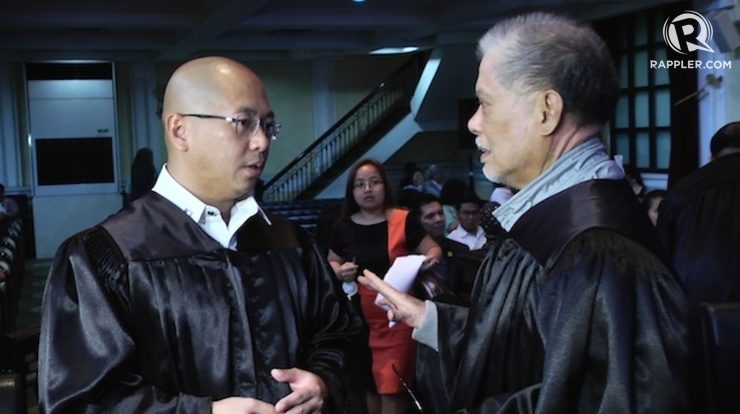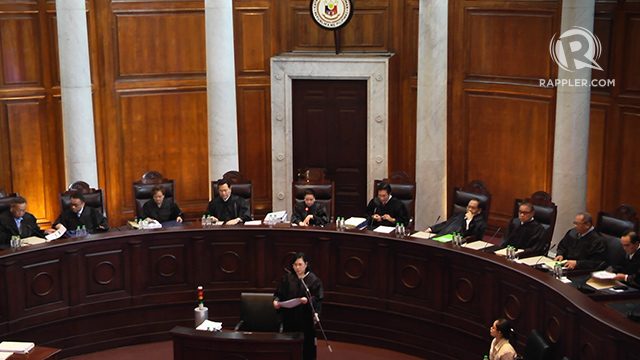SUMMARY
This is AI generated summarization, which may have errors. For context, always refer to the full article.

MANILA, Philippines (UPDATED) – Under questioning by a Supreme Court justice, the Philippine government’s chief counsel conceded on Tuesday, November 25, that the new military agreement between Manila and Washington DC does not guarantee American help should the Philippines’ maritime dispute with other countries escalate.
“There is no guarantee, your honor. But this helps, your honor, [to prevent a showdown between the Philippines and China],” said Acting Solicitor General Florin Hilbay on the 2nd and last day of oral arguments on the Enhanced Defense Cooperation Agreement (EDCA).
“What is important is that it entangles the US with the interests of the Philippines,” he added.
Supreme Court Associate Justice Antonio Carpio was testing Hilbay’s argument that the EDCA is an implementation of the Mutual Defense Treaty (MDT) wherein the two countries vowed to defend each other from armed attacks.
This is not what happened in 2012, the justice said.
Carpio went back to the 2012 incident in the Scarborough Shoal (Panatag), where the United States did not come to the aid of the Philippines when China took effective control of the shoal off the coast of Zambales province in Luzon.
“In 2012, China seized through overwhelming armed force Scarborough Shoal which is defined under the baselines law as part of Philippine territory. But the US said it is not covered under MDT because that is a disputed territory,” Carpio said.
Carpio also cited the failure of the US to come to Ukraine’s help when Russia-backed insurgents took Crimea.
“There is no guarantee, in other words, that Americans will come to our aid if we invoke the Mutual Defense Treaty,” Carpio said. Hilbay conceded.
Carpio asked the government counsel to submit a list of Philippine islands that are covered by the MDT.
‘Hope is free’
While the focus of the legal battle has been whether EDCA stands as an executive agreement or it needs Senate ratification, the Supreme Court justices themselves have gone back and forth grilling petitioners and Hilbay about the implemenation of the new military-to-military agreement in relation to the West Philippine Sea.
On Day 1 of oral arguments last week, Chief Justice Maria Lourdes Sereno appeared to be a defender of EDCA when she argued that prepositioned assets could have “inhibitory effects” in the West Philippine Sea. (READ: Justices to EDCA critics: How to defend West PH Sea?)
With the Philippines having one of the weakest militaries in Asia, the Aquino goverment has said that EDCA is necessary to improve the country’s “minimum credible defense” in light of China’s aggressiveness in the West Philippine Sea.
The EDCA allows the US military to construct facilities and preposition defense assets inside Philippine military bases.
At one point, Hilbay begged off questions on the benefits of EDCA and sought to redirect questions to its constituationality.
“My goal, your honor, is to defend the constitutionality of an agreement. That is all. I am not here to be Santa Claus….,” he responded under intense grilling from Carpio on how EDCA can prevent another Scarborough Shoal incident.
Lesson from Scarborough incident?
Hilbay said the government itself has learned a lot of things from the Scarborough incident and EDCA “might be” a response to the 2012 incident.
“This might be part of a whole range of responses of the President as commander in chief. Your honor, these are military matters. I’m not an expert on military matters. I don’t think a lot of people are experts on military matters. But if there are experts on military matters that would have to be the Department of National Defense. If there are experts on diplomacy that will have to be Department of Foreign Affairs,” he said.
Hilbay also suggested that US “can change its mind” on assisting the Philippines in case of armed attacks in the West Philippine Sea.
Carpio: It is not common sense to say that since the US said that they will not take sides in disputes in the West Philippine Sea, they will not come to our aid if Pagasa is invaded?
Hilbay: Your honor, the reality is very complex. Things change.
Carpio: So we are hoping that the US will come to our aid?
Hilbay: Hope is free your honor. We might as well have it. We do what we do. We do what we can. That is the EDCA, that is the VFA (Visiting Forces Agreement]. We also have the MDT.

‘Defensive preparation’
Hilbay argued that there are 2 principles under MDT. He said Carpio was talking about “defensive reaction,” where US is counted on to defend the Philippines in case of an armed attack. The other part of MDT, Hilbay said, is “defensive preparation” and this is where EDCA comes in.
Even without guarantees that US will come to the aid of the Phiilppines in the West Philippine Sea, Hilbay said the value of EDCA lies in the assistance that the US miilitary will provide to improve the country’s defense posture in terms of training, prepositioning of assets, and improvement of military facilities, runways, barracks, and ports.
“The value of the EDCA your honor is in terms of a lot of things. Number one, it actually assists to improve Philippine military bases and Philippine military facilities consistent with the training programs that we have in the VFA,” argued Hilbay.
Carpio: The only guarantee is your own self defense correct?
Hilbay: I’m here to defend EDCA your honor
Carpio: But I don’t want you to tell the world that we can rely on EDCA for our defense.
Hilbay: Absolutely not your Honor. We’re not saying that EDCA will save the country from all its problems. What we are saying is this helps. This helps improve runways, barracks, training facilities, ports. Those matters that are related to the training exercises.
Carpio: It helps us improve our equipment, our bases. But when the showdown comes and China attacks, the US will not necessarily be there, correct?
Not foreign military bases
Hilbay used a string of arguments to oppose suggestions in the first day of oral arguments last week that EDCA should be referred to the Senate. (READ: Trasmitting PH-US military pact to Senate discussed at SC)
- The court cannot refer EDCA to the Senate without declaring EDCA unconstitutional
- The court cannot force a referral the Senate without authority from the President, who has authority to refer international agreements to the Senate
- The Senate cannot be compelled to accept a responsibility it did not seek
- A court-mandated referral to the Senate diminishes the powers of the President “on matters that are within his prerogatives
- A court-mandated referral to the Senate will result in an international embarrassment for teh President as sole organ of foreign affairs
- A referral to the Senate is plain and simple delay
Hilbay’s focused his opening presentation on the argument that the constitutional requirement for “treaties and international agreement” to be ratified by the Senate does not apply to EDCA. He said it is a mere implementation of existing treaties already ratified by the Senate – the Mutual Defense Treaty of 1951 and the Visiting Forces Agreement of 1999.
Hilbay argued that not all international agreements need to be submitted to Senate. It is a “characterization” dependent on the position of the President and the Senate. He noted that no senator filed a petition to question the constitutionality of EDCA before the Supreme Court.
The constitutional requirement also applies only to foreign military bases, which Hilbay said is not the case with the facilities that will be built by the US military under EDCA.
“The general features of “foreign military bases” – extraterritoriality, exclusivity in use, and foreign ownership – are not present in these Agree Locations,” he said.
Hilbay also showed particular provisions in the VFA, particularly Article VIII, to argue that EDCA is a mere implemenation of these treaties.
- Aircraft operated by or for the US armed forces may enter the Philippines upon approval of the Government of the Philippines
- Vessels operated by or for the US armed forces may enter the Philippines upon approval of the Government of the Philippines
Hilbay added the EDCA is unlike foreign basing because it is “restrictive” in the sense that the US requires Philippine approval or invitation for each and every activity it plans to undertake. “Just like the VFA, any and all activities under the EDCA can only be ‘at the invitation’ or upon approval of the Philippine government.” – Rappler.com
Add a comment
How does this make you feel?
There are no comments yet. Add your comment to start the conversation.